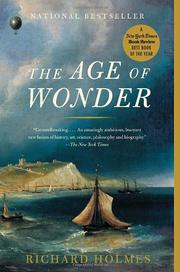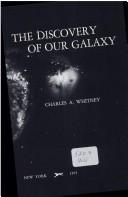| Listing 1 - 10 of 15 | << page >> |
Sort by
|
Book
Year: 1961 Publisher: Stuttgart : Wissenschaftliche Verlagsgesellschaft,
Abstract | Keywords | Export | Availability | Bookmark
 Loading...
Loading...Choose an application
- Reference Manager
- EndNote
- RefWorks (Direct export to RefWorks)
Book
Abstract | Keywords | Export | Availability | Bookmark
 Loading...
Loading...Choose an application
- Reference Manager
- EndNote
- RefWorks (Direct export to RefWorks)
Book
Year: 1928 Publisher: Thomery : La maison de Rosa Bonheur,
Abstract | Keywords | Export | Availability | Bookmark
 Loading...
Loading...Choose an application
- Reference Manager
- EndNote
- RefWorks (Direct export to RefWorks)
Stars --- Nebulae --- Herschel, William,
Book
ISBN: 1283058006 9786613058003 1400838126 9781400838127 9781283058001 6613058009 9780691148335 0691148333 Year: 2011 Publisher: Princeton, NJ
Abstract | Keywords | Export | Availability | Bookmark
 Loading...
Loading...Choose an application
- Reference Manager
- EndNote
- RefWorks (Direct export to RefWorks)
Discoverers of the Universe tells the gripping story of William Herschel, the brilliant, fiercely ambitious, emotionally complex musician and composer who became court astronomer to Britain's King George III, and of William's sister, Caroline, who assisted him in his observations of the night sky and became an accomplished astronomer in her own right. Together, they transformed our view of the universe from the unchanging, mechanical creation of Newton's clockmaker god to the ever-evolving, incredibly dynamic cosmos that it truly is. William was in his forties when his amateur observations using a homemade telescope led to his discovery of Uranus, and an invitation to King George's court. He coined the term "asteroid," discovered infrared radiation, was the first to realize that our solar system is moving through space, discovered 2,500 nebulae that form the basis of the catalog astronomers use today, and was unrivalled as a telescope builder. Caroline shared William's passion for astronomy, recording his observations during night watches and organizing his papers for publication. She was the first salaried woman astronomer in history, a pioneer who herself discovered nine comets and became a role model for women in the sciences. Written by the world's premier expert on the Herschels, Discoverers of the Universe traces William and Caroline's many extraordinary contributions to astronomy, shedding new light on their productive but complicated relationship, and setting their scientific achievements in the context of their personal struggles, larger-than-life ambitions, bitter disappointments, and astonishing triumphs.
Astronomers --- Herschel, Caroline Lucretia, --- Herschel, William,
Book
ISBN: 0511709269 Year: 2010 Publisher: Cambridge : Cambridge University Press,
Abstract | Keywords | Export | Availability | Bookmark
 Loading...
Loading...Choose an application
- Reference Manager
- EndNote
- RefWorks (Direct export to RefWorks)
The Herschels in this biography are Sir William Herschel (1738-1822), his sister Caroline (1750-1848) and Sir John Herschel (1792-1871), William's son. Sir William was an astronomer and telescope-maker who discovered the planet Uranus in 1781. He was appointed 'the King's astronomer' to George III in 1782, and under his patronage built the then largest telescope in the world. Caroline Herschel worked as her brother's assistant for much of his career but was also an accomplished astronomer in her own right, discovering eight comets and producing a catalogue of nebulae. Her nephew Sir John Herschel was also a distinguished astronomer who made many observations of stars in the southern hemisphere. This book by the astronomer and writer Agnes Clerke (1842-1907), published in 1895, provides both an analysis of their work and an assessment of its contribution to later astronomical research.
Astronomy --- History. --- Herschel, William, --- Herschel, Caroline Lucretia, --- Herschel, John F. W.

ISBN: 9781400031870 Year: 2010 Publisher: New York : Vintage Books,
Abstract | Keywords | Export | Availability | Bookmark
 Loading...
Loading...Choose an application
- Reference Manager
- EndNote
- RefWorks (Direct export to RefWorks)
"The Age of Wonder" explores the earliest ideas of deep time and space, and the explorers of "dynamic science": an infinite, mysterious Nature waiting to be discovered. Three lives dominate the book: William Herschel, his sister Caroline, and Humphry Davy.
Discoveries in science --- Science --- Scientists --- History --- History --- History --- Davy, Humphry, --- Herschel, Caroline Lucretia, --- Herschel, William, --- Great Britain --- Intellectual life

ISBN: 0394460685 9780394460680 Year: 1971 Publisher: New York : Knopf,
Abstract | Keywords | Export | Availability | Bookmark
 Loading...
Loading...Choose an application
- Reference Manager
- EndNote
- RefWorks (Direct export to RefWorks)
Astronomie --- Sciences --- Astronomy --- Histoire. --- History. --- Kepler, Johannes, --- Galilei, Galileo, --- Newton, Isaac, --- Herschel, William, --- Rosse, William Parsons, --- Parsons, William,
Book
ISBN: 9781107018389 9781139087681 9781139224918 1139224913 1139218395 9781139218399 1107018382 9781139218399 1107230918 1139210181 1280485450 1139223194 9786613580436 1139087681 1139215302 1139221485 Year: 2012 Publisher: Cambridge : Cambridge University Press,
Abstract | Keywords | Export | Availability | Bookmark
 Loading...
Loading...Choose an application
- Reference Manager
- EndNote
- RefWorks (Direct export to RefWorks)
"The astronomical observations of William Herschel (1738-1822) made him question the accepted model of the clockwork universe. This volume explains the development of Herschel's thoughts on what he called 'the construction of the heavens' and reprints his principal papers on this subject. The preliminary chapters provide an introduction to Herschel, including his unusual path to astronomy, the discovery of Uranus and his work on the evolution of stellar clusters, which eventually led him to challenge the unchanging Newtonian universe. The second half of the text comprises eight of Herschel's key papers on what we today would call cosmology, representing his progress between 1783 and 1814, fully annotated with historical notes and modern astrophysical explanations. Ideal for undergraduate and postgraduate students in the history of science and in astronomy, this volume explains Herschel's pivotal role in the transforma0tion from the clockwork universe to the 'biological' universe of modern astronomy"-- "William Herschel (1738-1822) was a musician and composer for the first half of his life, and astronomer to the King of Britain for the second half. Astronomers of the time might distinguish themselves either as makers of telescopes, or as observers, or as theoreticians. Herschel distinguished himself in all three. In November 1778, while a musician in the English spa resort of Bath, Herschel as an amateur observer ground and polished for his 7-ft reflector a mirror that was simply the finest anywhere; and using it he discovered the planet we know as Uranus. This won him the patronage of the King and with it the opportunity to give up music and dedicate himself to astronomy. With funding from the King he then built himself the biggest reflector ever seen, and he conducted a brisk trade in telescopes, the crowned heads of Europe competing to be allowed to buy a Herschel reflector"--
Astronomers --- Astronomy --- Cosmology --- History. --- Herschel, William, --- Science --- Gershelʹ, Fridrikh Vilʹgelʹm, --- Gershelʹ, Vilʹi︠a︡m, --- Herschel, Frederick William, --- Herschel, Friedrich Wilhelm, --- Herschel, Wilhelm,
Book
ISBN: 9780511667589 0511667582 9780521768924 0521768926 9781139220415 1139220411 9781139223843 1139223844 1139217321 9781139217323 9781139217323 1139209310 1107225264 1280773448 9786613684219 1139222139 1139214241 Year: 2011 Publisher: Cambridge Cambridge University Press
Abstract | Keywords | Export | Availability | Bookmark
 Loading...
Loading...Choose an application
- Reference Manager
- EndNote
- RefWorks (Direct export to RefWorks)
Sir William Herschel's contributions to astronomy during the late eighteenth century are unrivalled. His lasting legacy is his dedicated all-sky survey of star clusters and nebulae, and these objects continue to be among the most studied in the night sky. This unique book provides a complete re-examination of Herschel's entire catalogue of non-stellar discoveries, making it the most accurate and up-to-date reference of its kind. Retrace the footsteps of one of history's greatest astronomers and explore every one of Herschel's landmark discoveries, including those considered to be lost or non-existent. Read detailed notes about each object's appearance and physical characteristics, and view hundreds of photos of the most intriguing Herschel objects, along with dozens of sketches of what is visible at the eyepiece. This superb book is a must-have for amateur astronomers seeking new and exciting observing challenges, and as the ultimate reference on the Herschel objects.
Astronomy --- Stars --- Nebulae --- Galactic nebulae --- Gaseous nebulae --- Nebulas --- Galaxies --- Sidereal system --- Circumstellar matter --- Clusters --- Herschel, William, --- Gershelʹ, Fridrikh Vilʹgelʹm, --- Gershelʹ, Vilʹi︠a︡m, --- Herschel, Frederick William, --- Herschel, Friedrich Wilhelm, --- Herschel, Wilhelm,
Book
ISBN: 9789811249273 9789811247774 Year: 2024 Publisher: Hackensack, N.J. : World Scientific,
Abstract | Keywords | Export | Availability | Bookmark
 Loading...
Loading...Choose an application
- Reference Manager
- EndNote
- RefWorks (Direct export to RefWorks)
Today we know much about the sky: how stars are born, how they live and die, and how the universe as a whole evolves. We have learned of the existence of another type of matter, indifferent to light and yet decisive for the formation of galaxies, and we have a hint of a dark energy that since the last 4.5 billion years has taken over the control of the cosmos. We postulated and then discovered and even photographed black holes and listened to the faint rustle of the space-time ripple produced when these monsters devour each other. We reached these astonishing results (recognized by a bunch of Nobel Prizes and filling every day the media with wonders for the eyes and the mind) by the marriage of physics and astronomy that unified the Earth with the sky and then by the leap forward of science and technology in the Twentieth Century. This rich heritage has ancient roots. It was built by accumulating discoveries with errors, observations with fantasies, myths, and superstitions with flashes of genius, over a span of millennia, since Homo sapiens, turning his eyes to the immutable and perfect sky, began to ask questions. The book is a narration of the answers to these questions that had evolved over time: a progressive path, inserted in the general history, with some second thoughts and many obstacles. This is a saga of men and machines where greatness sometimes mixes with misery and passion often borders on sacrifice and even martyrdom. Why should we know it? Because our current knowledge is the result of these efforts and of the preconceptions that accompanied them. The challenge has been to present this complex and intricate subject without resorting to any formulas, so that it can be accessible to a wide audience of curious people, including high school and university students and in general all those who normally keep themselves informed of scientific things. A rich bibliography has also been added in the appendix for those wishing to learn more on one or more topics
Astronomy --- Astronomie --- History. --- Histoire. --- Copernicus, Nicolaus, --- Kepler, Johannes, --- Brahe, Tycho, --- Galilei, Galileo, --- Cassini, Giovanni Domenico, --- Huygens, Christiaan, --- Bradley, James, --- Newton, Isaac, --- Herschel, William, --- Rosse, William Parsons, --- Fraunhofer, Joseph von, --- Kirchhoff, G. --- Huggins, William, --- Hale, George Ellery, --- Aristarchus, --- Leavitt, Henrietta Swan, --- Galilei, Galileo, --- Copernic, Nicolas, --- Kepler, Johannes, --- Brahe, Tycho, --- Cassini, Jean-Dominique, --- Huygens, Christiaan, --- Bradley, James, --- Newton, Isaac, --- Herschel, William, --- Parsons, William, --- Huggins, William, --- Fraunhofer, Joseph von, --- Kirchhoff, Gustav, --- Aristarque de Samos, --- Leavitt, Henrietta Swan, --- Hale, George Ellery,
| Listing 1 - 10 of 15 | << page >> |
Sort by
|

 Search
Search Feedback
Feedback About UniCat
About UniCat  Help
Help News
News